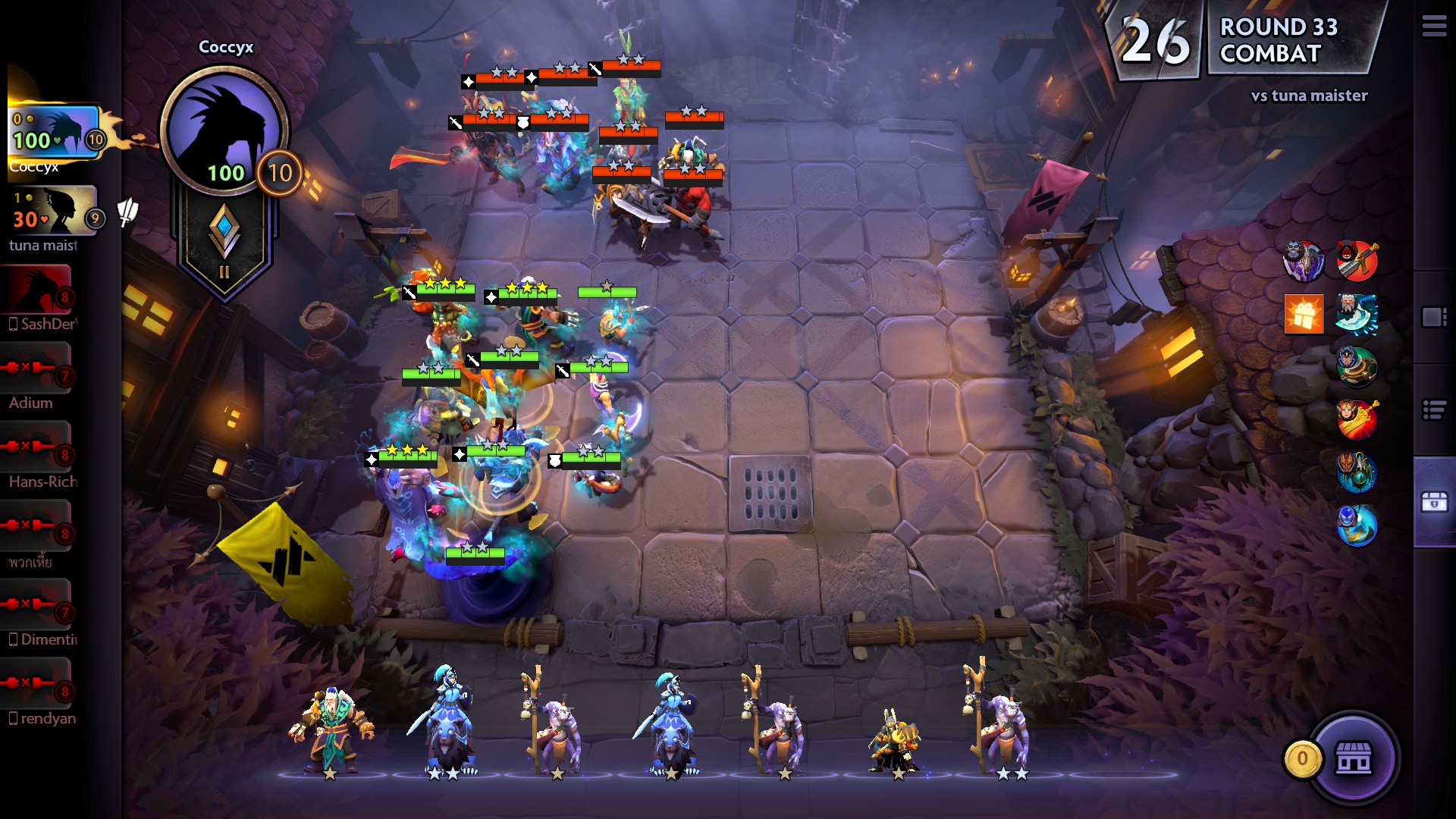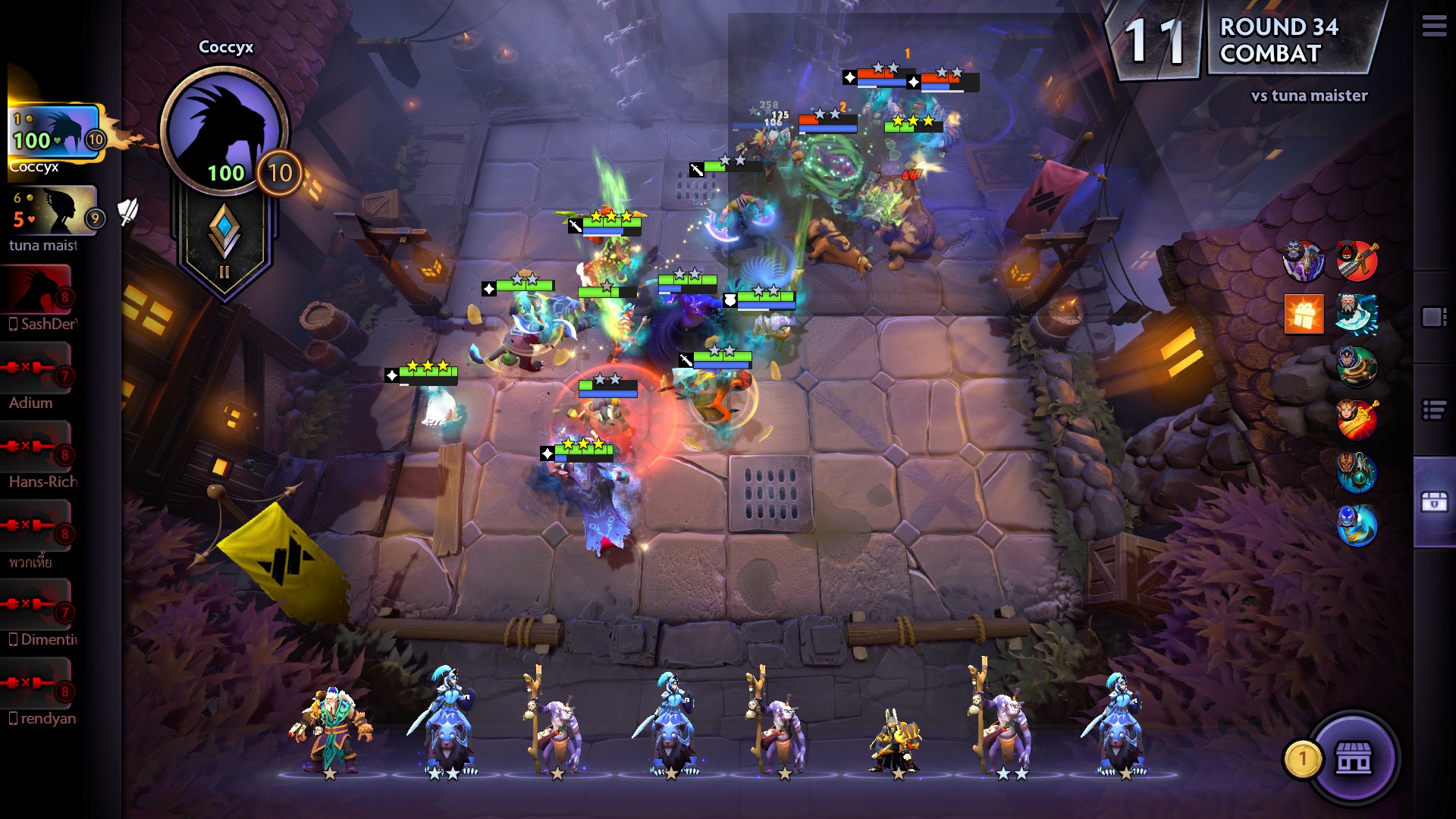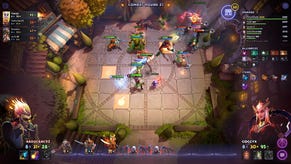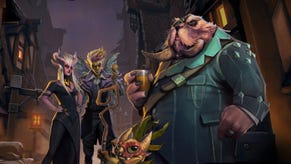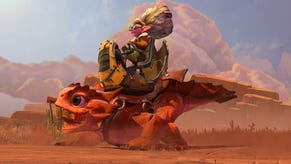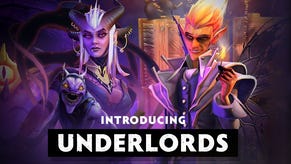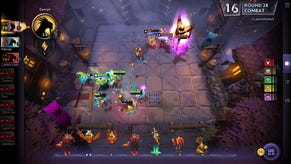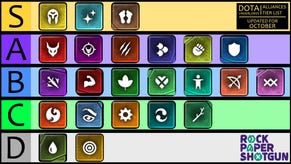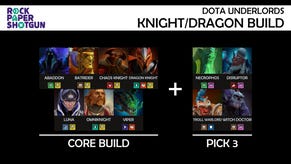Wot I Think: Dota Underlords
Lords of luck
I look at my enemy, and I despair. Their army bristles with max-level units, scary abilities, synergies between both. Losing one more fight will knock either of us out of the game. It's do or die. I plunge all my funds into last-ditch recruitment, refreshing the available roster of heroes time and time again in the hopes of stumbling across one - just one, please, just one - of the heroes I need. My pleading works. The final unit clicks into my freshly-oiled machine with three seconds left on the clock, and I hold my breath as our armies square up one last time.
That's Dota Underlords at its best. It's a shame you often need to put up with it at its worst.
When you start playing, it's an enjoyable nightmare. Enjoyable, at least, if you've already battled through part of it before. Dota Underlords takes simplified versions of Dota 2 heroes and pits them against each other in automated multiplayer battles. You're pitted against seven opponents, fighting in a series of clashes against each of them while they also battle each other. Your aim is to be the last general standing: each loss punches out some of your lifeblood, based on the stage of the game and how hard you got hit. Heroes are recruited from a selection of five at the top of screen, but you can always spend some gold to spin the hero wheel again if you don't like what's on offer.
To dodge a drubbing, you need to build a better army. You'll want it to be big, and equipped with the right items. You'll want it to be varied, usually with a tanky frontline, squishy damage dealers and helpful background wizards. You'll want to exploit alliances, and field heroes with the same trait to unlock passive bonuses. You'll want those heroes to be levelled-up, which you can do by buying another copy of that hero and merging them together. You'll also want heroes to be of a powerful higher tier, who will start appearing part-way through the game.
You can't have it all.
Underlords is a balancing act where at first you don't see all the plates. The longer I played, the more considerations spun into view. Should I plop down multiple level two instances of the same hero, or a level one unit that nets me the alliance bonus that gives everyone the 'lifesteal' ability? Do I want to spend loads of gold on the guaranteed benefit of expanding the size of my army, or a more modest sum on searching for new heroes? Should I start pursuing a level three murder scorpion?
As I said last week, these decisions will be much easier if you're already acquainted with the scorpion. I still found my first couple of hours with Underlords overwhelming, even though my Dota days have furnished me with an understanding of all the heroes and proper nouns. To me, a picture of a hammer is obviously a Skull Basher, an item I should hand to a hero with a high attack speed like Drow Ranger so they can get the most out of the item's stun chance. Graham just sees a picture of a hammer, with the relevant information scattered across separate screens and without enough time to absorb it - let alone build a strategy around it.
Navigating Underlords' web of decisions was, for a time, monumentally absorbing. My Dota head start let me leap over most of the info-absorption stage, and get stuck straight into the strategy. I quickly started recognising patterns, getting into habits, making myself break them, honing in on what makes the game tick. I was reminded of Artifact, where mounting experience muscles out the role of random chance. Sure, success stems from the whims of a slot machine - but you get to choose how to spin it.
Broadly speaking, you can approach Underlords in two different ways. One is to simply go after alliance bonuses, bluntly but effectively racking up match-swinging passive abilities. Or you can try to be clever, and think about everything else at the same time.
In one game I focused on protecting a back line that gradually built up strength over the course of each fight. I had a bat-riding troll coat everyone in tar, and a shaman rain down escalating damage by repeatedly splitting in two like a gross magic worm. I guarded them with beefy warriors and their united armour bonus, plus another shaman type that (before the latest patch) let me turn an additional enemy into a frog.
I lost, in the end, but I blamed myself rather than misfortune. There was so much I could have done differently. I could have tried to beef up my back line so an enemy phantom assassin didn’t give them so much trouble. I could have recruited two more friends for my trolls, unlocking a ridiculously powerful late game buff that gives everyone the attack speed of a pissed off house cat on amphetamines. Or I could have abandoned trolls entirely.
Much boils down to restraint. You're doomed if you don't get some early level two heroes on the board, but if you spend too much too early you'll be wiped out by the players who wisely save their gold. That's thanks to that old grim appraisal of our fundamentally unjust economic system: you need money to make money. Only here it's a bit more fair, thanks to genuine equality of opportunity.
For every ten gold you earn, you get given an extra gold coin at the start of the round (although anything past 50 gold won't get you the extra coin). That incentivises you to take a battering in the early rounds, spending just enough to keep yourself from being knocked out early. At first I kept getting scuppered on the shoals of greed, chasing after too many high-level units at once. Then I grew far too cautious, eliminated with gold to spare thanks to overambitious (yet exciting) last-second plunges through the recruitment bar.
For a good fifteen hours, I got hooked on figuring out how to thread that line. I yelled and giggled as my armies tussled, delighted in the drama of fights that went down to the wire. I'd see battles won (seemingly) off the back of an ability I'd prioritised over an alliance bonus, then clap myself on the back for eschewing the more obvious choice. For the past five hours, though, my back has remained thoroughly un-clapped.
My enthusiasm used to be unrelenting, feasting on the thought that sits atop the throne of my taste in games: "If only I'd done that!". Now that I'm no longer able to put my finger on where I'm going wrong, the appeal's drained out, as if from a punctured carton of yesterday's milk. Part of the problem is that I can't even be sure I am going wrong.
The soup is so thick with variables that it's often hard to tell what’s contributing to success. I've emphasised how Underlords gives you the chance to subvert randomness, but this is still a game where success hinges on being served up copies of the heroes you're chasing. The odds are that one of your seven opponents will get luckier than you, and the better you and your opponents get, the less room there is for canny decision-making to overcome that. In other words, I'm not convinced the skill ceiling is high enough for strategy to prevail often enough over chance.
Not that I've reached that ceiling. I could start building my armies more around what my opponents are doing, abandoning chases after heroes when I see another player is stockpiling them, thus removing my shots at victory from the communal pool. There is an unavoidable extent to which you have to play the hand you're dealt, though. If I try to bend my plans too far they'll break.
I won a game just before I sat down to write this review, but it felt more hollow than deserved. I'll almost certainly play more, even before Valve add new heroes and items which will probably, for a time, hook me afresh (it is still in early access after all). But for now, the appeal has become more compulsive than considered.


